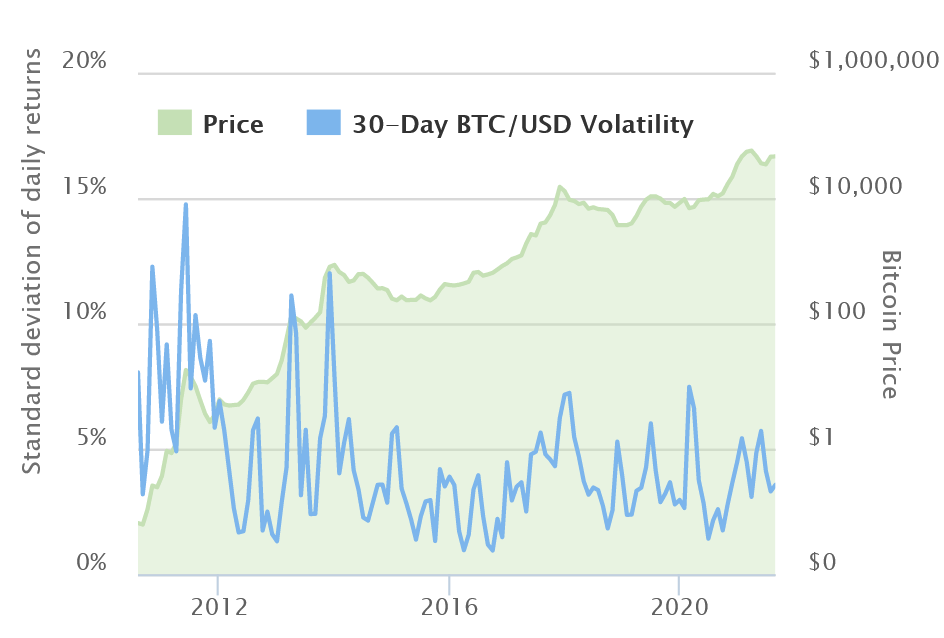With models ranging from Plan B’s Stock-to-Flow (S2F) to Willy Woo’s Network Value to Transactions (NVT), finding the correct way to value bitcoin (BTC) has proven tricky. But according to Nik Bhatia, Bitcoin advocate and author of Layered Money, there is no single way to go about BTC valuation, only “a multitude of firm roots” that we can explore.
In a new essay titled Valuing Bitcoin and Diagnosing Its Unprecedented Volatility, Bhatia argues that with all of the different models that are currently used by BTC investors and analysts, “extreme volatility” should not be unexpected at all. In fact, Bhatia says, it “should be the baseline assumption” for the BTC price, given that “nobody knows how it should be valued.”
Bitcoin price and volatility:

Further in the essay, Bhatia justified his position that there is no one correct model by pointing out the large differences in price estimates between on-chain analyst Willy Woo’s NVT model, and Plan B’s S2F model, which attempts to value BTC using similar methodology as is often used for gold and silver.
The same difference was also pointed out by PlanB himself in a tweet last week:
Commenting on the various BTC valuation models, the popular author wrote:
“An honest study of bitcoin valuation reveals that its growth stems from a multitude of firm roots. Some of the roots are easier to value with on-chain and hash rate analysis, and others are harder to quantify, like the network effects taking place right now as bitcoin fully captures the world’s attention.”
Further, Bhatia also went into detail on his grand vision for the future of bitcoin:
“I imagine that government currencies will cease to exist in countries without globalized economies, as people conduct online commerce in either BTC or USD-linked stablecoins instead of unstable and non-digital government currencies.”
He added that he believes that an entire generation, already born, is unlikely to ever have a relationship with a traditional bank.
“In these scenarios, bitcoin will emerge as a world reserve currency, knocking on the door of the dollar. How would you value that?”, Bhatia concluded.
And while he remains an optimist on bitcoin’s long-term outlook, the latest Chinese crypto crackdown continues to keep investors on the alert for a potential short-term price reaction.
As recorded by the Whale Alert Twitter account on Sunday, USD 3.1bn in BTC and USD 2.4bn in ethereum (ETH) has already been moved out of exchange wallets belonging to Huobi, an exchange with ties to Mainland China, and over to a larger number of unknown wallet addresses.
And although this is not necessarily bad news, it shows that the regulatory crackdown has real implications for what happens on-chain.
Judging from findings from the on-chain analytics firm Santiment, the crackdown could even have a positive implication, given that bitcoin and crypto holders are forced to move funds off exchanges and instead take personal custody of it. According to the firm, exchange balances of BTC are now at their lowest since May 2019, making it “a solid indication” of less selling pressure for bitcoin.
On the negative side, however, a metric known as the “all exchanges whale ratio” has recently crossed above 0.5, a level one analyst on the on-chain analysis site CryptoQuant said traders should “be careful” around.
“We need to make sure price stays above 40K. Price action below 40K could be fast and volatile,” the analyst warned about bitcoin’s short-term price outlook.
At 16:15 UTC, BTC trades at USD 41,842 and is almost unchanged in a day. The price is up by almost 4% in a week, trimming its monthly losses to less than 15%.
____
Other insights:
____
Learn more:
– Bitcoin Price to Face Another Test as Central Banks Eye Rate Hikes
– Standard Chartered Sees Major Upside to Ethereum, Bitcoin
– Pantera CEO Trims Bitcoin Price Forecast For 2021, Sees ETH Outperforming
– Bitcoin May Surpass USD 66K in 2021 and USD 400K by 2030 – ‘Panel of Experts’
Credit: Source link













































































































































